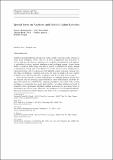Special Issue on Assistive and Rehabilitation Robotics
Author(s)
Mohammed, Samer; Park, Hae Won; Park, Chung Hyuk; Amirat, Yacine; Argall, Brenna
Download10514_2017_9627_ReferencePDF.pdf (265.6Kb)
PUBLISHER_POLICY
Publisher Policy
Article is made available in accordance with the publisher's policy and may be subject to US copyright law. Please refer to the publisher's site for terms of use.
Terms of use
Metadata
Show full item recordAbstract
Assistive and rehabilitation robotics currently covers a broad spectrum of research areas, from intelligent robots that act as aides, companions and educators; to robots that provide physical assistance for mobility, manipulation and support; to embedded robotics, ambient intelligence and intelligent spaces. People whose ability to perform daily living activities is limited or inhibited by injury, disease or impairment include (but are not limited to) stroke survivors with sustained neurological injuries, elderly populations with skeletal muscle weakness, persons with low-vision or blindness, traumatic injuries to the brain or spinal cord, and a variety of degenerative diseases that affect cognition, muscle tone and motor control.
Date issued
2017-02Department
Massachusetts Institute of Technology. Media Laboratory; Program in Media Arts and Sciences (Massachusetts Institute of Technology)Journal
Autonomous Robots
Publisher
Springer US
Citation
Mohammed, Samer, Hae Won Park, Chung Hyuk Park, Yacine Amirat, and Brenna Argall. “Special Issue on Assistive and Rehabilitation Robotics.” Autonomous Robots 41, no. 3 (February 18, 2017): 513–517.
Version: Author's final manuscript
ISSN
0929-5593
1573-7527